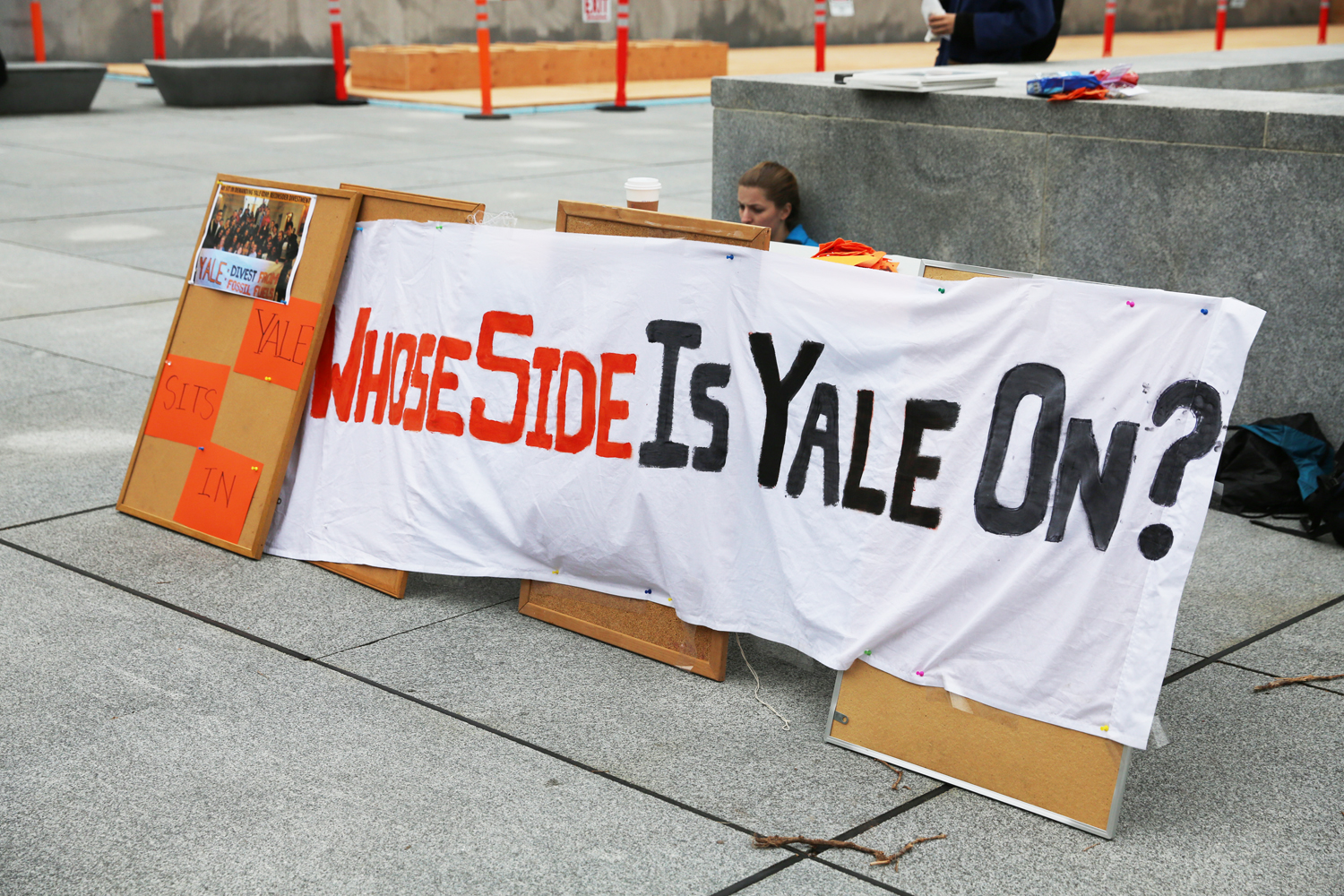
Nearly six months after the divestment debate on campus turned into open confrontation on the steps of Woodbridge Hall, Fossil Free Yale has stated that the push for divestment is far from over in the coming year.
Fossil Free Yale — the student group advocating divestment — has kept a low profile on campus since 48 members of the group staged a sit-in in Woodbridge Hall in April, demanding that the Yale Corporation publicly reconsider its decision not to divest from fossil fuels. Despite the publicity the group garnered when 19 students were threatened with arrest, FFY’s actions failed to sway the Yale Corporation. Coming into the new school year, it remained uncertain how the group would proceed.
“They are not at a point where they will give us an open room to negotiate,” FFY student organizer Elias Estabrook ’16 said of the administration. “But months have passed since then, so we don’t really know what is going on behind closed doors.”
Estabrook said FFY is posed to keep the pressure on and explore new tactics to push for divestment. He added that the University’s willingness to engage the group on discussions of divestment in the coming months will indicate how FFY will respond and take action moving forward.
Still, in April, administrators urged that more actions like last year’s sit-in would only disrupt discussion, rather than push it in a more productive direction.
In an April email to the News, Senior Advisor to the President and Provost Martha Highsmith wrote that University President Peter Salovey had committed to advance the arguments and evidence presented by FFY through the Advisory Committee on Investor Responsibility (ACIR) and agreed to forward their statement directly to the Yale Corporation.
Highsmith could not be reached for comment Tuesday.
ACIR chair and Yale Law School professor Jonathan Macey LAW ’82 said his committee and FFY are continuing to work together to discuss issues related to Yale’s response to the climate change dilemma. Still, he said he is uncertain about the likelihood that divestment of fossil fuels will be adopted University-wide at the present time.
“I do not know how feasible the push is for a reconsideration of the recently-adopted policy on divestment at this point in time,” Macey wrote in an email. “My supposition is that Yale will wait to see how these new initiatives are working before reconsidering its position on divestment, but this is a matter for President Salovey and for the Yale Corporation.”
In lieu of divesting, Macey said the University is engaged in several initiatives to address climate change — including Yale’s Chief Investment Officer David Swensen urging Yale’s external investment managers to consider the impact of global warming in their investments, the administration’s efforts to devote resources towards teaching and research on the topic and the implementation of a new campus carbon reduction program.
He added that ultimately, Yale’s most important contribution to climate change will come from its teaching and research.
But for members of FFY, the impact of global warming is only one reason to divest. Rather, FFY student organizer Phoebe Chatfield ’18 said, it is the importance of “climate justice” — including the health issues, corrupt political economy and adverse community impact associated with the fossil fuel industry — that should impel the University to take a stand through its investment portfolio.
“Solutions that try to address climate change are not true solutions unless they also work against those systems of injustice,” Chatfield said.
She added that though FFY will continue to work with the ACIR, the strategy is much more complex than just pushing through an inside channel.
One idea being explored by the group is building a stronger alumni and faculty base of support, which could then be leveraged by students to bolster the strength of their claims in the eyes of the University, Estabrook said. Devin Judge-Lord FES ’13, who is helping the group in this effort to reach a broader network of former students, said that alumni provide the institutional memory in the push to force current leaders to “show whose side they are on.”
“So far, students have done the heavy lifting. Unfortunately, the voice of students has been ignored,” Judge-Lord said. “If we are to awaken the hearts and minds of our current leaders, alumni will need to realize how much power we hold and lend our various talents to the push for divestment.”
Estabrook said that in regards to faculty, as of June 2015, the group had garnered over 130 signatures from professors across the University in support of divestment. He added that one concrete goal of FFY this year is to get faculty in the room with high-level administrators.
Finally, a major source of new support for FFY will be the freshman class, Estabrook said, adding that roughly 25 new students attended the group’s most recent meeting, Estabrook said.
“I think freshmen can have a huge impact in FFY because we have an entire four years to dedicate to the issue,” said Arabelle Schoenberg ’19, one of the new freshmen at the meeting. “Having freshman join right away will build a strong foundation and ensure that FFY always has experienced students working tirelessly to achieve our goal.”
The Yale Corporation announced its decision not to divest in August 2014.







